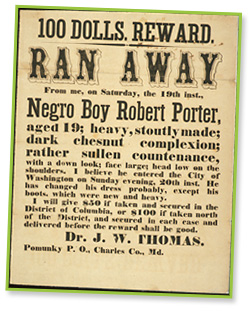Halfway to Freedom
High School: Grades 9–12
Story
Page: 1 | 2 | 3 | 4 | 5 | 6 | 7 | 8
Late that evening, after Lavinia's bedtime, Shepherd came to visit. Hannah immediately recognized him as the guide who had brought her to the house. Lavinia was right: he was handsome, despite the white streak of a scar on his neck. By listening quietly to his conversation with John Jones as they sat around the kitchen stove, Hannah soon learned more about the young man.
In addition to his job at the stable, Shepherd worked as a messenger, carrying letters and delivering packages throughout the city. This second job gave him many opportunities to spread information to the supporters of the Underground Railroad. At the barbershop, Shepherd's father gathered news from his customers. Meanwhile, the waiter at the hotel reported any suspicious-looking travelers. Together, these three black men formed a sort of defensive spy network. They'd been especially busy since the passage of the Fugitive Slave Act of 1850, which gave slave owners permission to pursue alleged runaways in free states and ordered the cooperation of local authorities. Chicago's City Council refused to enforce the law, while the leaders of the city's black community and several white abolitionists banned together to resist the slave hunters.
Shepherd was proud of his role in the resistance movement. That night, he brought good news: the hunters prowling the Chicago region for the past month had gone. "As soon as the snow melts," he promised Hannah, "we'll get you on your way again."
"Please be careful, Shepherd," Mary warned. "Those hunters don't like to go home empty-handed. If they don't find some poor fugitive, they'll capture any man—even a man with freedom papers."
"Just let them try to put me in chains!" Shepherd growled. "Some day, I swear, I'll free my brothers!" An angry fire gleamed in his eyes as he spoke.
"I hope we can end slavery without bloodshed!" Mary exclaimed. "Some of the wisest, most respected men in our nation today are abolitionists. Both white men like William Lloyd Garrison and black men like Frederick Douglass, who was once a slave himself, are speaking out against slavery. Abolitionist societies are writing petitions to congressmen, senators, governors, and the President of the United States."
Downloads (pdf)


